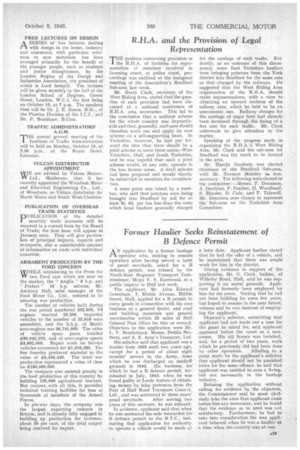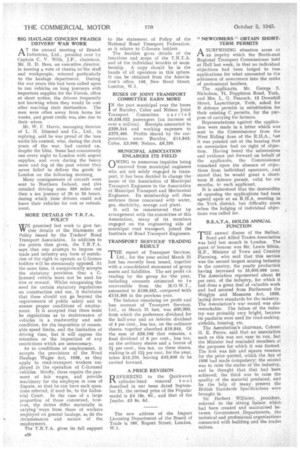Former
Page 21

Page 22

If you've noticed an error in this article please click here to report it so we can fix it.
Haulier Seeks Reinstatement of B Defence Permit AN application by a former haulage _operator who, seeking to resume operation after having served a term of penal servitude, asked for a B defence permit, was refused by the North-East Regional Transport Commissioner,'Major F. S. Eastwood, at a public inquiry in Hull last week.
The . applicant, Mr. John Edward Greenham, 7, Ribble Avenue, Ribble Street, Hull, applied for a B permit to carry goods in connection with his own business as a general dealer, and road and building materials and general merchandise within 25 miles of Hull General Post Office for hire or reward. Objectors to the application were Mr. L. V. Brooksbank, Messrs. Peddie Brothers, and A. E. Acey's Transport, Ltd.
His solicitor said that applicant was a haulier from 1935 until two years ago, except for a period of about eight months' service in the Army, from which he was discharged on medial grounds in 1942. His business, for which he had a B defence permit, terminated in July, 1943, when he was found guilty at Leeds Assizes of obtaining money by false 'pretences from the Port of Hull Road Transport Control, Ltd., and was sentenced to three years' penal servitude. After serving two years of this sentence, he was released.
In evidence, applicant said that when he was sentenced his -wife forwarded his B defence permit to the R.T.C., intimating that application for authority to operate a vehicle would be made at a later date. Applicant further stated that he had the offer of a vehicle, and he maintained that there was ample work for him in the district.
Giving evidence in support of the application, Mr. G. Clark, builder, of Willerby Road, Hull, said he was supporting it on moral grounds. Applicant had formerly been employed by him for six years. Stating that he had not been building for some few years, but hoped to resume in the near future, witness said he was desirouS of employing the applicant.
Objector's solicitor, submitting that applicant had not made out a case for the grant he asked for, said applicant appeared before the court as a new-, corner. His old licence was forfeited, and, for a period of two years, work which he previously did had been done
by other operators. Alluding to a point mad,by the applicant's solicitor that applicant should not be punished twice for the same offence, he said that applicant was entitled to earn a living, but not necessarily in the haulage industry.
Refusing the application without calling for evidence by the objectors, the Commissioner said he must obv.1ously take the view that applicant came before him asa newcomer, and he found that the evidence as to need was not satisfactory. Furthermore, he had to take into consideration the way applicant behaved when he was a haulier at a time when the country was at war.
BIG HAULAGE CONCERN PRAISES DRIVERS' WAR WORK AT the annual meeting of Bristol Industries, Ltd., presided over by Captain C. V. Wills, JP., chairman. Mr, H. D. Bees, an executive ,director, in moving a vote of thanks tofthe staff and workpeople, referred particularly to the haulage department. During the war years this had been called upon to run vehicles on long journeys with important supplies for the Forces, often at short notice, the drivers frequently not knowing where they would be sent after reaching their destination. The men were often away from home for weeks, and great credit was also due to their wives. •
Mr. W. F. Harris, managing director of L. H. Dimond and Co., Ltd., in replying, said he was proud of the 'non under his control, who, during the dark years of the war, had carried on, despite the blitz. Some had consistently run every night to London with urgent supplies, and even during the heavy snow and fog of the past winter they never failed to deliver the goods in London on the following morning.
Many consignments of aircraft were sent to Northern Ireland, and this entailed driving some 350 miles and then a sea journey of 20 to 24 hours, during which time drivers could not leave their vehicles for rest or refreshment.
MORE DETAILS ON T.R.T.A. POLICY
WE 'promised last week to give further details of the Statement of Policy issued by the Traders' Road Transport Association. In addition to the points then given, the T.R.T.A. says that any attempt to impose on trade and industry any form of restriction of the right to operate as C-licence holders will be strenuously opposed. At the same time, it unequivocally accepts the statutory provision that a Clicensed vehicle must not be used for hire or reward. Whilst recognizing the need for certain statutory regulations on construction and use, it maintains that these should not go beyond the requirements of public safety and to ensure proper conditions of employment. It is accepted that there must be regulations as to maintenance of vehicles in a roadworthy and safe condition, for the imposition of reasonable speed limits, and the limitation of driving time, but it will oppose the retention or the imposition of any restrictions which are unnecessary.
As to conditions of employment, it accepts the provisions of the Road Haulage Wages Act, 1938, as they apply to rciad-transport workers employed in the operation of C-licensed vehicles. Briefly, these require the payment of fair wages, and provide machinery for the employee in case of dispute, so that he can have such questions referred, if need be, to the Industrial Court. In the case of a large proportion of those concerned, however, the duties differ materially in varying ways from those of workers employed on general haulage, as do the • sircumstances and nature of the employment. The T.R.T.A. gives its ,full support to the statement of Policy of the National Road Transport Federation, as it relates to C-licence holders.
The booklet gives details of the functions and scope of the T.R.T.A. and of the individual benefits of membership. A copy should be in the hands of all operators in this sphere. It can be obtained from the Associa. tion's office, 146, New Bond Street London, W.I. • BUSES OF JOINT TRANSPORT COMMITTEE EARN MORE
TN the past municipal year the buses 1 of Burnley, Colne and Nelson Joint Transport Committee carried 45,538,022 passengers (an increaee of over a million). Receipts amounted to £339,344 and working expenses to £273,460. Profits shared by the corporations were: Burnley, £14,843; Colne, 23,906; Nelson, £6,250.
MUNICIPAL ASSOCIATION ENLARGES ITS FIELD OWING to numerous inquiries being received from municipal engineers
• who are not solely engaged in transport, it has been decided to change the name of the Association of Municipal Transport Engineers to the Association of Municipal Transport and Mechanical Engineers. Its membership will thus embrace those concerned with water, gas, electricity, sewage and plant.
It will be remembered that by arrangement with the committee of this Association, many of its members engaged on the engineering side of municipal road transport, joined the Institute of Road Transport Engineers.
TRANSPORT SERVICES' TRADING RESULT
THE report of Transport Services, Ltd., for the year ended March 31 last has recently been issued, together with a consolidated statement of group assets and liabilities. The net profit on trading by the group for 'the year, including amounts estimated to I e recoverable from the M.O.W.T., amounted to £109,552, compared iwith £115,305 in the previous year.
The balance remaining on profit and loss account of Transport Services, Ltd., at March 31 last, was £68,950, from which the preference dividend for the half-year and an interim dividend of 4 per cent., less tax, on the ordinary shares, together absorbed £10,844. Of the sum of £58,106 that remains, a final dividend of 6 per cent., less tax, on the ordinary shares and a bonus of, 2+ per cent., less tax, on these shares, making in all 12+ per cent, for the year, takes £15,270, leaving 242,836 to be carried forward.
A PRICE REVISION REFERRING to the Quickwork cylinder-head removal tool described in our issue dated September 21, the revised price of the Popular model is £4 18s. 6d., and that of the Jumbo, £5 8s. 6d.
The new address of the Import Licensing Department of the Board of Trade is 189, Regent Street, London, W.1.
" NEWCOMERS " OBTAIN SHORTTERM PERMITS A SURPRISING situation arose at ri an inquiry which the North-east Regional Transport Commissioner held at Hull last week, in that no individual objections had been lodged to two. applications for what amounted to the admission of newcomers into the ranks of professional hauliers.
• The applicants, Mr. George S. Nicholson, 71, Poppleton Road, York, and Mrs. L. G. Peacock, 13 Downhill Street, Layerthorpe, York, asked for B defence permits in substitution for their existing C permits, for the purpose of carrying for farmers.
Representations against the application were made in a letter which was sent to the Commissioner from the West Riding Area of the R.H.A., but it was pointed out at the hearing that an association had no right of objection. Having heard the submissions and evidence put forward on behalf of the applicants, the Commissioner remarked upon the absence of objections from individual operators, and stated that he would grant a shortterm B defence permit, valid for six months, to each applicant.
It is understood that -the desirability of opposing the applications had been agreed upon at an R.H.A. meeting in. the York district, but difficulty arose &when the lodging of individual objections was called for.
B.S.A.T.A. HOLDS ANNUAL FUNCTION
THE annual dinner of the Ballast, Sand and Allied Trades. Association was held last month in London. The guest of honour was Mr. Lewis Silkin, M.P., Minister of Town and Country Planning, who said that this section was the second largest mining industry in the country, the yearly production having increased to 33,000,000 tons. The Association represented about 85 per cent, of the industry, for which it had done a great dear of valuable work and had secured from Parliament the Weights and Measures Act, 1936, laying down standards for the industry. The Association's war record was also remarkable. The future of the industry was probably very bright, because its products were used for road-making, airfields, housing, etc. The Association's chairman, Colonel H, E. Peirce, said that an association such as this was not easy to run, but the Minister had reminded members ot the purposes for which it was formed. The first was fair and square measure for the price quoted, which the Act of 1936 had made compulsory; the second was to raise the status of the industry, and he thought that that had been achieved; the third was to raise the quality of the material produced, and by ;the help of many present the British Standards Specifications were brought in.
Sir Herbert Williams, •president, referred to the strong liaison Which. had been created and maintained between Government Departments, the technical and professional organizations connected with building and the trades unions.




















































